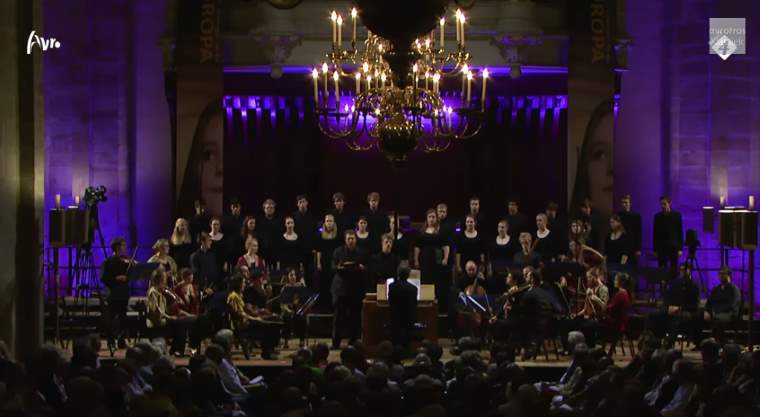To mark the 250th anniversary of the death of George Frideric Handel, Howard Arman conducts a fantastic performance of the “Dettingen Te Deum” at the Marktkirche in Halle on April 14, 2009. Three choirs join forces accompanied by The English Concert and the Händelfestspielorchester – around 200 musicians perform in the chancel of this magnificent church. The “Dettingen Te Deum” (HWV 283) is a Christian song of praise to celebrate the victory of the English over the French at Dettingen in the year 1743.
Program
With the starting times in the video:
- 00:15 We praise Thee, oh God. After a brief instrumental prelude, the work opens with the triumphant, jubilant chorus with trumpets and drums (“We praise Thee, O God”), written for the five parts, the sopranos being divided into first and seconds, containing also a short alto solo leading to a closing fugue.
- 04:00 All the earth doth worship Thee. The second part is also an alto solo with a five-part chorus of the same general character.
- 06:25 To Thee all angels cry aloud. A semi-chorus in three parts.
- 08:38 To Thee Cherubim and Seraphim. A full chorus that is majestic in its movement and rich in harmony.
- 11:45 The glorious company of the Apostles. A quartet and chorus, dominated by the bass, with responses from the other parts.
- 14:00 Thou art the King of Glory. A short, full chorus.
- 16:37 When Thou tookest upon Thee to deliver man. a stirring bass solo with trumpets. A fanfare of trumpets introduces the next four numbers, all choruses.
- 20:00 When Thou hadst overcome the sharpness of death
- 21:50 Thou sittest at the right hand of God
- 24:53 Sinfonia
- 25:23 We, therefore, pray Thee
- 26:26 Make them to be number’d with Thy Saints.
- 27:42 Day by day we magnify Thee
- 30.45 Vouchsafe, oh Lord, to keep us this day without sin
- 32:22 Oh Lord, in Thee have I trusted. It begins with a long alto solo with delicate oboe accompaniment that makes the effect very impressive when voices and instruments take up the phrase in a magnificent outburst of power and rich harmony and carry it to the close.
Dettingen Te Deum
On 27 June 1743, the British army and its allies, under the command of King George II and Lord Stair, won a victory at the Battle of Dettingen, over the French army, commanded by the Maréchal de Noailles and the Duc de Grammont. On the King’s return a day of public thanksgiving was appointed, and Handel, at that time “Composer of the Musick to the Chapel Royal,” was commissioned to write a Te Deum and an anthem (“The King Shall Rejoice”) for the occasion.
The work was composed between 17 and 29 July 1743 and was first performed on 27 November 1743 in the Chapel Royal of St. James’s Palace, London in the presence of George II.
The Dettingen Te Deum is not a Te Deum in the strict sense, but a grand martial panegyric. The Te Deum (also known as Ambrosian Hymn or A Song of the Church) is an early Christian hymn of praise. The title is taken from its opening Latin words, Te Deum laudamus, rendered as “Thee, O God, we praise”.
The hymn remains in regular use in the Catholic Church in the Office of Readings found in the Liturgy of the Hours, and in thanksgiving to God for a special blessing such as the election of a pope, the consecration of a bishop, the canonization of a saint, a religious profession, the publication of a treaty of peace, a royal coronation, etc. It is sung either after Mass or the Divine Office or as a separate religious ceremony. The hymn also remains in use in the Anglican Communion and some Lutheran Churches in similar settings.
Handel’s Dettingen Te Deum contains eighteen short solos and choruses, mostly of a brilliant, martial character, the solos being divided between the alto, baritone, and bass.
Sources
- Dettingen Te Deum on Wikipedia
- Te Deum on Wikipedia

